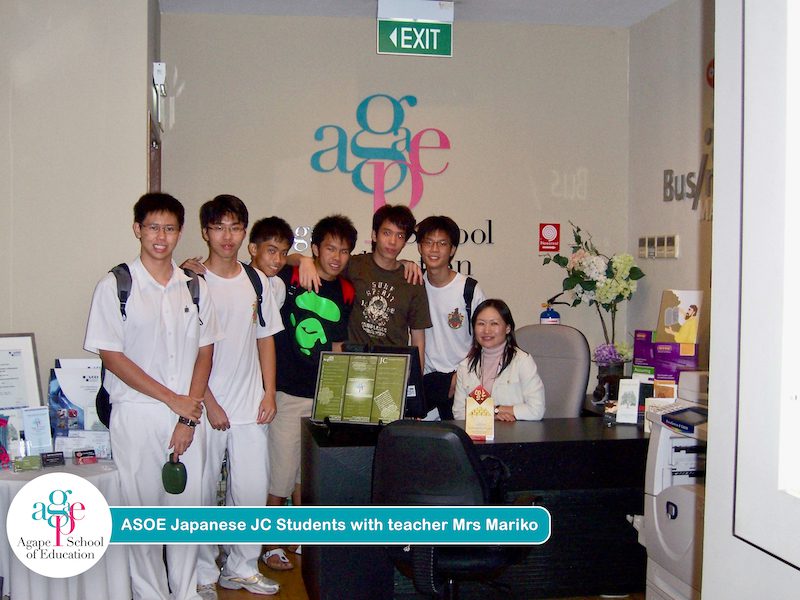-
Secondary School and Junior College Classes
Agape School of Education offers Japanese classes tailored to MOELC’s Japanese curriculum for students taking Japanese as either a 2nd or 3rd language.
Classes are structured such that they follow MOELC’s schedule, and regular assessments will be conducted to ensure that students’ proficiency fulfills MOELC requirements.

The Secondary 1 curriculum will be taught over a course of 3 terms and covers 12 topics. At the end of the academic year, students should have a proficiency equivalent to N5 of the Japanese Language Proficiency Test.
Students should be able to:
- Form simple sentences using basic vocabulary
- Have simple conversations.
- Describe where they live and people they know
- Write and understand short passages.
Textbooks used
文化初級日本語(1)、(2)
Secondary 1
At Agape School of Education, our secondary courses are tailored to follow the MOELC curriculum.

The Secondary 2 curriculum will be taught over a course of 3 terms and covers 12 topics. At the end of the academic year, students should have a proficiency equivalent to N4 of the Japanese Language Proficiency Test.
Students should be able to:
- Read and understand passages on familiar topics
- Hold short conversations on familiar topics
- Describe simple situations and communicate immediate needs
Textbook used
文化初級日本語(2)、(3)
Secondary 2
At Agape School of Education, our secondary courses are tailored to follow the MOELC curriculum.

The Secondary 3 curriculum will be taught over a course of 3 terms and covers 11 topics. At the end of the academic year, students should have a proficiency equivalent to N3 of the Japanese Language Proficiency Test.
Students should be able to:
- Communicate at a level that is sufficient for travel
- Converse and discuss everyday topics and personal interests
- Relate situations and experiences both orally and in writing
- Understand vocabulary in everyday conversation topics
Textbook used
文化初級日本語(3)、(4)
Secondary 3
At Agape School of Education, our secondary courses are tailored to follow the MOELC curriculum.

The Secondary 4 curriculum will be taught over a course of 3 terms and covers 4 topics. Students will also be exposed to past year papers to prepare them for the GCSE ‘O’-Level Examination. At the end of the academic year, students should have a proficiency equivalent to N3 of the Japanese Language Proficiency Test.
Students should be able to:
- Communicate at a level that is sufficient for travel
- Converse and discuss everyday topics and personal interests
- Relate situations and experiences both orally and in writing
- Understand vocabulary in everyday conversation topics
Textbook used
文化中級日本語(1)
Secondary 4
At Agape School of Education, our secondary courses are tailored to follow the MOELC curriculum.

Agape School of Education Japanese JC Students with teacher Mariko
Students may take Japanese at either H1 or H2 level in JC. The H1 programme covers 4 chapters and is taught over a course of 3 terms. The H2 programme covers 15 topics and is taught over a course of 8 terms. Both programmes prepare students for the GCSE ‘A’-Level Examination at their respective levels.
At the end of the course, students who have completed the H1 programme should have a proficiency level equivalent to that of N2 of the Japanese Language Proficiency Test. H2 students should have been sufficiently prepared for tertiary studies at institutions that use Japanese as a medium of instruction.
Students should be able to:
- Communicate fluently both orally and in writing.
- Write detailed essays on a wide variety of topics
- Understand most of the vocabulary that appears in contemporary media
- Discuss and debate on a variety of issues
Textbook used:
H2:. 文化中級日本語 2. 日本への招待,
H1: 文化中級日本語(2) 2.毎日の聞き取り40日(下)
Junior College
At Agape School of Education, our Junior College courses are tailored to follow the MOELC curriculum.
MOELC Admission Test Preparation
Over 10 years of experience coaching students to excel at the MOELC Admission Test
The MOELC Admission Test Preparation classes are geared towards preparing students for the MOELC Admission Test, offered 3 times a year. The classes follow the MOELC curriculum and are designed to improve students’ Japanese ability in a short time.
Learning a third language has been shown to be beneficial to students in terms of mental agility and professional value. The Ministry of Education Language Centre (MOELC) offers numerous languages that students can study as their third language. Only students at the top 10% of their PSLE cohort are deemed eligible by MOE to study a foreign language as their third language. Students who do not meet this criteria must obtain a passing mark in the Admissions test before their school can register them.
To sit for the admissions exam, students need a sound knowledge of the language. The MOELC holds four entrance exams every three months and interested students can apply through MOE or their school. A passing grade of 50% is required to gain entry into the programme. However, the Admission test is a very selective written exam and those who fail must contact MOELC to re-sit the exam.
Once the students have been selected, they must upkeep a minimum grade to continue taking their third language throughout secondary school and into junior college. In addition, students taking a foreign language as their Mother Tongue in-lieu have to reapply to MOELC for the second language when they enter secondary school.
At Agape School of Education, our course will prepare students not only to pass the Admissions test but to ace it! Our courses follow the MOELC syllabus closely so that students are well-prepared. Each of our lessons is structured similarly to the MOELC structure, right down to the duration of the class! We ensure that our students’ competency levels are regularly assessed with a mock exam every three months. Our aim is to impart a comprehensive knowledge of the MOELC syllabus so that your child is always one step ahead of the rest! Contact us today to find out how we can best prepare your child for the MOELC Admissions test, syllabus or to enquire about remedial lessons!
